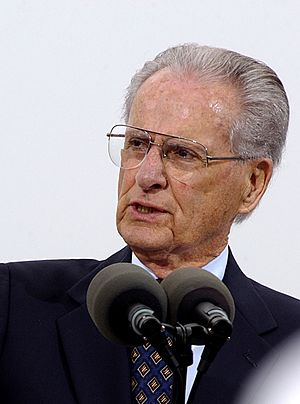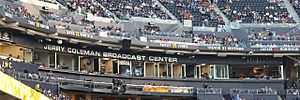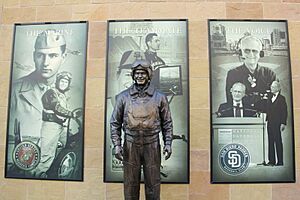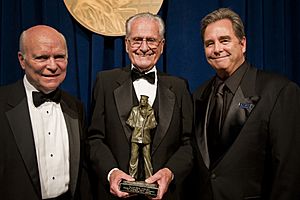Jerry Coleman facts for kids
Quick facts for kids Jerry Coleman |
|||||||||||||||||||||||||||||
|---|---|---|---|---|---|---|---|---|---|---|---|---|---|---|---|---|---|---|---|---|---|---|---|---|---|---|---|---|---|

Jerry Coleman, August 2005
|
|||||||||||||||||||||||||||||
| Second baseman / Manager | |||||||||||||||||||||||||||||
| Born: September 14, 1924 San Jose, California, U.S. |
|||||||||||||||||||||||||||||
| Died: January 5, 2014 (aged 89) San Diego, California, U.S. |
|||||||||||||||||||||||||||||
|
|||||||||||||||||||||||||||||
| debut | |||||||||||||||||||||||||||||
| April 20, 1949, for the New York Yankees | |||||||||||||||||||||||||||||
| Last appearance | |||||||||||||||||||||||||||||
| September 29, 1957, for the New York Yankees | |||||||||||||||||||||||||||||
| MLB statistics | |||||||||||||||||||||||||||||
| Batting average | .263 | ||||||||||||||||||||||||||||
| Home runs | 16 | ||||||||||||||||||||||||||||
| Runs batted in | 217 | ||||||||||||||||||||||||||||
| Managerial record | 73–89 | ||||||||||||||||||||||||||||
| Winning % | .451 | ||||||||||||||||||||||||||||
| Teams | |||||||||||||||||||||||||||||
As player
As manager
|
|||||||||||||||||||||||||||||
| Career highlights and awards | |||||||||||||||||||||||||||||
|
|||||||||||||||||||||||||||||
|
|||||||||||||||||||||||||||||
Gerald Francis Coleman (born September 14, 1924 – died January 5, 2014) was a famous American baseball player. He played as a second baseman for the New York Yankees in Major League Baseball (MLB). Later, he became a manager for the San Diego Padres.
Jerry Coleman was a true hero, both on the baseball field and in the sky. He was a pilot in the United States Marine Corps during World War II and the Korean War. He flew many combat missions in both wars. After his playing career, he became a beloved baseball broadcaster. In 2005, he was honored by the National Baseball Hall of Fame and Museum for his amazing broadcasting work.
Contents
Playing Baseball: Jerry Coleman's Career
Jerry Coleman was born in San Jose, California. He went to Lowell High School. He spent his entire playing career with the New York Yankees. Before joining the main team in 1949, he played for six years in the Yankees' minor league system.
Rookie of the Year and All-Star
In his first year, 1949, Coleman hit for a .275 batting average. He was also the best second baseman in fielding. The Associated Press named him the rookie of the year. He was also a top contender for the Major League Baseball Rookie of the Year Award.
In 1950, Jerry Coleman became an All-Star. He played incredibly well in the 1950 World Series. His strong defense helped him win the Babe Ruth Award. This award is given to the World Series' most valuable player.
The Colonel: A War Hero
Jerry Coleman was nicknamed "The Colonel." This was because he was a lieutenant colonel in the U.S. Marine Corps. He was a Marine pilot who put his baseball career on hold to serve his country. He fought in World War II and the Korean War.
As a Marine aviator, he flew 120 combat missions. He flew 57 missions during World War II and 63 in Korea. He received many honors for his bravery. These included two Distinguished Flying Crosses. Jerry Coleman was the only MLB player to fight in two wars.
World Series Wins and Retirement
After his military service, Coleman's baseball career was affected by injuries. He played less often, usually coming off the bench. He retired after the 1957 season. He ended his career on a high note, hitting .364 in the 1957 World Series. The Yankees lost that series to the Milwaukee Braves. During his career, he played in six World Series and won four of them.
Broadcasting: A New Career Path
After retiring from playing, Jerry Coleman started a new career. In 1958, he became a personnel director for the New York Yankees. This job involved finding new players. Later, he decided to try broadcasting.
From Player to Announcer
In 1960, Coleman began working for CBS television. He did pre-game interviews for the Game of the Week. From 1963 to 1970, he called Yankees games on radio and TV.
In 1972, Coleman became the main radio announcer for the San Diego Padres. He held this job almost every year until his death in 2014. In 1980, he even managed the Padres for one season.
Famous Catchphrases
Jerry Coleman was known for his fun catchphrases in San Diego. His most famous one was, "You can hang a star on that one, baby!" He would say this after an amazing play. At home games, a tinsel star would even swing from his broadcast booth!
Other popular phrases included "Oh Doctor!", "And the beat goes on," and "The natives are getting restless." He used these phrases during exciting moments. For example, when the Padres won the 1984 National League Championship Series. This win sent them to their first ever World Series.
Honors and Legacy
Jerry Coleman was sometimes called the "Master of the Malaprop." This meant he sometimes made funny mistakes with words on the microphone. But people loved him for it! In 2005, he received the Ford C. Frick Award. This award is given by the National Baseball Hall of Fame and Museum for excellent broadcasting.
He was inducted into the San Diego Padres Hall of Fame in 2001. In 2007, he joined the National Radio Hall of Fame. The Padres also honored him by naming their press box "The Jerry Coleman Broadcast Center."

On September 15, 2012, the Padres unveiled a statue of Coleman at Petco Park. It is the second statue at the park, honoring his great contributions.

Awards and Recognition
Jerry Coleman received many military medals for his service:
- Distinguished Flying Cross (2)
- Air Medal (13)
- American Campaign Medal
- Asiatic-Pacific Campaign Medal
- World War II Victory Medal
- National Defense Service Medal
- Korean Service Medal
- United Nations Service Medal
- Philippine Liberation Medal
In 2011, Coleman was inducted into the International Air & Space Hall of Fame. This honor recognized his service as a combat pilot in both World War II and the Korean War. He was the only active MLB player to fly in combat in two wars. The San Diego Air & Space Museum even restored a F4U "Corsair" fighter-bomber. It is painted to look like Coleman's aircraft from the Korean War.
Death
Jerry Coleman passed away on January 5, 2014. He was 89 years old. He died after being hospitalized following a fall at his home. He was buried at Miramar National Cemetery.
Lasting Legacy
In 2015, a sports facility at Marine Corps Recruit Depot San Diego was named in honor of Jerry Coleman. This shows how much he is remembered for his service and achievements.
 | Jackie Robinson |
 | Jack Johnson |
 | Althea Gibson |
 | Arthur Ashe |
 | Muhammad Ali |


